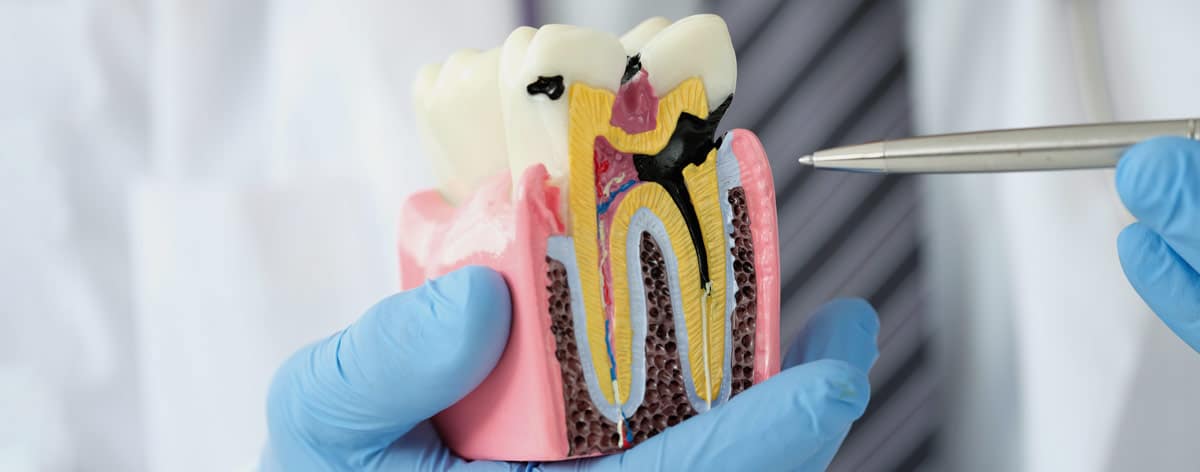Toothache can be more than just a nuisance; it can be a sign of an underlying dental problem that requires attention.
While some tooth pain can be alleviated with home remedies, knowing when to see a dentist is crucial to ensure the issue doesn’t persist.
In this blog post, we’ll discuss when you should visit a dentist to get rid of toothache for good and how to effectively relieve pain in the meantime.
Recognising the severity of your toothache
Understanding the intensity of your tooth pain can help you decide when to see a dentist. While some discomfort may be manageable with home remedies, other signs suggest you need professional care.
Sharp, throbbing pain vs. dull discomfort
A sharp, throbbing pain usually signals a more serious issue, such as tooth decay or infection. This type of pain can indicate that the affected tooth is severely damaged and may require professional treatment to prevent it from worsening.
Pain that lasts for more than a few days
Tooth pain that persists beyond a few days is a strong indication that you need to see a dentist. If home remedies like a cold compress or pain relievers provide only temporary relief, it’s time to consult a dental professional to identify and address the root cause.
Swelling and sensitivity to temperature
If you notice swelling around the sore tooth or experience heightened sensitivity to hot or cold foods and drinks, it could be a sign of gum disease, an abscess, or an infection. These symptoms should not be ignored, as they can worsen without treatment.
Home remedies, and when they are not enough
There are several home remedies that can temporarily relieve tooth pain, but they are not a substitute for professional dental care. Relying solely on these can allow the underlying cause of your toothache to go untreated.
Home remedies for toothache relief
If you’re waiting to see a dentist but need some relief from your tooth pain in the meantime, several home remedies can help ease the discomfort. Keep in mind that these are temporary solutions, and professional dental care is essential for long-term relief.
Clove oil: Known for its antimicrobial properties, clove oil can help numb the sore tooth and reduce inflammation. Simply apply it with a cotton ball to the affected area.
Saltwater rinse: Dissolving half a teaspoon of salt in warm water can help kill bacteria and rinse away food particles, providing temporary relief from tooth pain.
Peppermint tea bags: A cooled peppermint tea bag can be placed against the affected area to ease the soreness. The soothing properties of peppermint help calm sensitive teeth.
Hydrogen peroxide rinse: A mild hydrogen peroxide rinse (diluted with equal parts water) can kill bacteria and reduce swelling. Do not swallow hydrogen peroxide and always follow the recommended dose.
Vanilla extract: The alcohol in vanilla extract can help numb the pain when applied directly to the sore tooth with a cotton bud, offering temporary pain relief.
Ice wrapped in cloth: Applying a wrapped ice pack to the cheek near the affected tooth can help reduce inflammation and numb the pain temporarily.
Temporary relief vs. long-term solutions
A natural remedy such as rinsing with warm salt water or using a pain-relieving gel on a cotton ball may provide short-term relief, but they don’t address the root cause of the problem. If the pain returns frequently, it’s important to see a dentist to ensure you receive long-term treatment.
The risks of ignoring persistent pain
Ignoring persistent tooth pain can lead to more severe dental issues, such as tooth decay or an abscess. If left untreated, these conditions can worsen and require more complex treatments, such as a root canal or even tooth extraction.
Why over-the-counter painkillers are only a short-term fix
The American Dental Association recommends pain relievers like ibuprofen to help ease toothache temporarily, but recognises that they only mask the pain. They do not treat the underlying dental problem. For long-lasting toothache relief, it’s essential to address the cause of the pain, which can often only be diagnosed by a dentist.
Common causes of toothaches that require professional treatment
Several dental issues can lead to tooth pain, many of which require professional care to prevent further damage and complications.
Tooth decay and cavities
One of the most common causes of tooth pain is tooth decay. If left untreated, cavities can grow larger, causing increased pain and the need for more invasive treatments, such as fillings or root canals.
Gum disease (gingivitis and periodontitis)
Red gums and inflammation are signs of gum disease, which can lead to tooth sensitivity, sore teeth, and even tooth loss if not treated by a dentist. Gum disease can also lead to toothaches, especially if there is plaque buildup near the gum line.
Abscesses and infections
An infected tooth or gum abscess can cause intense pain and swelling. Infections need immediate treatment to prevent them from spreading and causing more severe health conditions, such as a blood infection. A dentist can drain abscesses and treat the infection with antibiotics if necessary.
Cracked or damaged teeth
A cracked or broken filling or tooth can expose the sensitive nerves inside the tooth, leading to tooth pain. Damaged teeth should be repaired promptly to avoid complications such as infection or further damage.
What to expect during your dental appointment
When you visit a dentist for a sore tooth, you can expect a thorough examination and specific treatment options tailored to your condition.
Diagnostic process: X-rays and examinations
The dentist will likely take X-rays to evaluate the extent of the damage to the affected tooth. This will help them determine the underlying cause of your pain, whether it’s due to tooth decay, gum disease, or another dental problem.
Depending on the diagnosis, your dentist may recommend treatments such as fillings for cavities, antibiotics for infections, or even a root canal for severe decay. In some cases, tooth extraction may be necessary if the tooth is beyond repair.
How dentists address pain and discomfort
Your dentist will take steps to ensure you’re as comfortable as possible during treatment. This may include numbing the affected area with a local anaesthetic or providing pain relief medications after the procedure to reduce inflammation and ease discomfort.
Preventing future toothaches
Once you no longer feel pain, it’s important to adopt habits that prevent future dental issues and help maintain your oral health.
Visiting your dentist regularly for check-ups and cleanings is the best way to prevent toothaches. Early detection of problems such as plaque buildup or early signs of tooth decay can help prevent more serious dental issues down the line.
Good oral hygiene and lifestyle habits
Brushing your teeth twice a day with fluoride toothpaste and flossing daily can prevent plaque buildup and gum disease, two major causes of tooth pain. Using dental floss to remove food particles and food debris between your teeth is essential for maintaining a healthy mouth.
Avoiding sugary foods and acidic foods can protect your teeth from decay. Eating soft foods when experiencing a sore tooth and avoiding chewing on hard items can also help prevent further pain. Drinking plenty of water and avoiding sugary drinks is important for your overall oral health.
The role of fluoride and dental sealants
Using fluoride toothpaste can strengthen tooth enamel, reducing the risk of tooth decay. In some cases, your dentist may recommend dental sealants to provide an extra layer of protection, especially for children younger than 16 or those at higher risk of tooth decay.
When to seek immediate help
While most toothaches can wait for a dental appointment, there are certain situations when you should seek immediate professional help.
If you experience a bad taste in your mouth, a high temperature, or notice pus coming from around the affected tooth, these could be signs of an infection. Immediate treatment is necessary to prevent the infection from spreading.
Pain caused by wisdom teeth or impacted teeth can often be intense and require professional treatment to relieve pain and remove the offending tooth.
If the pain becomes unbearable or is accompanied by swelling, you should see a dentist as soon as possible. Unchecked tooth pain can lead to serious dental problems, such as nerve damage, and may even spread to the surrounding gums or bone.
Let Fulham Road Dental help you get rid of toothache for good!
If you’re struggling with persistent tooth pain or a sore tooth, it’s crucial to seek professional help before the problem worsens.
At Fulham Road Dental, our experienced team of emergency dentists is here to provide fast and effective relief. Whether you’re dealing with tooth decay, gum disease, or a more serious dental issue, we offer comprehensive treatments designed to address the root cause of your pain and ensure long-lasting relief.
Don’t wait – contact us today to schedule an appointment and get rid of that toothache for good!




